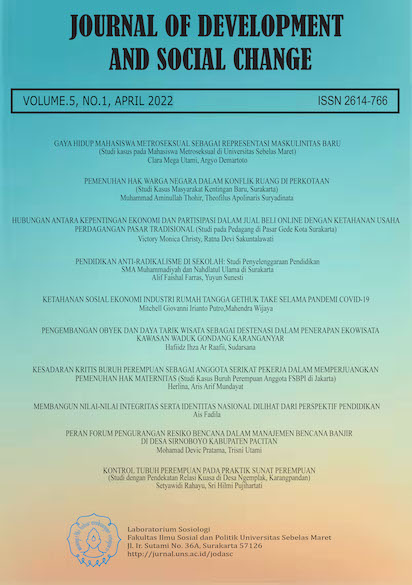Hubungan Tingkat Solidaritas, Tingkat Konformitas Terhadap Tindakan Cancel Culture Penggemar K-POP di Indonesia
Abstract
This study aims to explain the relationship between the level of solidarity, the level of conformity, and cancel culture actions among K-Pop fans in Indonesia. The theories used in this research are Emile Durkheim's theory of solidarity and Talcott Parsons' structural functionalism theory. The study employs a quantitative approach, survey method, and explanatory research design. Data were collected through online questionnaires from 96 K-Pop fans who follow the X account @starfess (population: 977,853 accounts). Data analysis techniques included data tabulation and correlation statistics tests (product-moment correlation test, partial product-moment correlation, and multiple correlation), assisted by the Statistical Package for the Social Sciences (SPSS) for Windows version 25.0. The results indicate a strong relationship between solidarity and conformity rxz = 0.777, a weak relationship between conformity and cancel culture actions rzy = 0.366, and a weak relationship between solidarity and cancel culture actions rxy = 0.330. The relationship between solidarity and cancel culture actions through conformity among K-Pop fans in Indonesia is rxy.z = 0.078, indicating an impure relationship. Collectively, solidarity, conformity, and cancel culture actions show a low relationship Ry.xz = 0.375. These findings demonstrate that Emile Durkheim's theory of solidarity and Talcott Parsons' structural functionalism theory effectively explain the interconnectedness of these three variables.
Full Text:
PDFReferences
Alifah, N. N. (2022). Indonesia Jadi Negara dengan Fans K-Pop Terbanyak di Dunia. GoodStats.Id. https://goodstats.id/article/indonesia-masuk-peringkat-pertama-dengan-fans-k-pop-terbanyak-di-dunia-6w71d
Anjarini, D. N. (2020). Cancel Culture in the Frame of Comparison of Indonesia and South Korea. Jurnal Scientia Indonesia, 6(1), 59–82. https://doi.org/10.15294/jsi.v6i1.36131
Boutabia, A. (2022). Solidarity in Times of Crisis. International Journal of Language and Literary Studies, 4(1), 41–51. https://doi.org/http://doi.org/ 10.36892/ijlls.v4i1.788
Choon, C. M. (2021). Cancel Culture in South Korea Far Too Toxic, Say Experts. Magzter. https://www.magzter.com/stories/Newspaper/The-Straits-Times/Cancel-culture-in-South-Korea-far-too-toxic-say-experts
Cinthia, R. R., & Kustanti, E. R. (2017). Hubungan Antara Konformitas Dengan Prokrastinasi Akademik Pada Mahasiswa. Jurnal Empati, 6(April), 31–37.
CNN. (2023). Fan Hallyu Meroket 18 Kali Lipat, Apa Rahasia K-Pop Bisa Mendunia? https://www.cnnindonesia.com/internasional/20230514231631-113-949472/fan-hallyu-meroket-18-kali-lipat-apa-rahasia-k-pop-bisa-mendunia.
Darmawati, & Kurnia, I. (2024). STUDI LITERATUR : ANALISIS INTERAKSI PARASOSIAL FANDOM K-POP BTS ARMY DI PEKANBARU DALAM PENGGUNAAN PLATFORM WEVERSE. Pediaqu : Jurnal Pendidikan Sosial Dan Humaniora, 3(4), 5510–5523.
Dewi, T. N., & Nurudin. (2022). Perilaku Komunikasi Komunitas Kpopers Palangka Raya dalam Loyalitas pada Idola. Jurnal Komunikasi Nusantara, 4(1), 78–88. https://doi.org/10.33366/jkn.v4i1.97
Haryono, P. (2014). Hubungan Gaya Hidup dan Konformitas Dengan Perilaku Konsumtif Pada Remaja Siswa Sekolah Menengah Atas Negeri 5 Samarinda. Psikoborneo: Jurnal Ilmiah Psikologi, 2(4), 268–273. https://doi.org/10.30872/psikoborneo.v2i4.3674
Hekmatyar, V., & Vonika, N. (2021). PENGARUH SOLIDARITAS SOSIAL TERHADAP RESILIENSI BURUH DITENGAH PANDEMI COVID-19. PEKSOS: Jurnal Ilmiah Pekerjaan Sosial, 20(1), 85–97.
JakpatInsight. (2016). The Fandom for Idols – A Survey Report on Kpop Fans in Indonesia. https://insight.jakpat.net/the-fandom-for-idols-a-survey-report-on-kpop-fans-in-indonesia/
Laili, A. N., Suharso, P., & Sukidin. (2024). Navigating Cancel Culture in Indonesia: Understanding Cyberbullying and Social Control in Viral Cases (September-November 2023). Jurnal Antropologi: Isu-Isu Sosial Budaya, 26(1), 59–67.
Lestari, K. A., & Fauziah, N. (2017). Hubungan Antara Konformitas Dengan Motivasi Belajar Pada Siswa Di Sma Muhammadiyah Kudus. Jurnal EMPATI, 5(4), 717–720. https://doi.org/10.14710/empati.2016.15451
Louis, H. Saint. (2021). Understanding cancel culture: Normative and unequal sanctioning. First Monday, 26(7). https://doi.org/10.5210/fm.v26i7.10891
Mardeson, E., & Mardesci, H. (2022). Fenomena Boikot Massal (Cancel Culture) Di Media Sosial. Jurnal Riset Indragiri, 1(3), 174–181. https://doi.org/10.61069/juri.v1i3.27
Mayasari, F. (2022). Etnografi Virtual Fenomena Cancel Culture dan Partisipasi Pengguna Media terhadap Tokoh Publik di Media Sosial. Journal of Communication and Society, 1(01), 27–44. https://doi.org/10.55985/jocs.v1i01.15
Ng, E. (2020). No Grand Pronouncements Here..: Reflections on Cancel Culture and Digital Media Participation. Television and New Media, 21(6), 621–627. https://doi.org/10.1177/1527476420918828
Pawening, A. S. (2023). Social Network Analysis: K-Pop Fans’ Social Action as Digital Solidarity via Twitter. Eduvest - Journal of Universal Studies, 3(5), 878–894. https://doi.org/10.59188/eduvest.v3i5.811
Putri, M. C., Nisa, T. K., & Vitasari, R. A. (2024). Membangun Harmonisasi di Tengah Masyarakat Majemuk (Studi Kasus Toleransi Umat Islam dengan Budha di Kudus). JSA : Jurnal Studi Agama, 8(1), 77–85. https://doi.org/10.19109/xndcpq60
Safitri, A., Fitasari, H., & Khunaifi, A. F. (2023). POTRET INTERAKSI SOSIAL KOMUNITAS PUNK NAGRASH DI DESA PULOPANCIKAN KABUPATEN GRESIK JAWA TIMUR. Jurnal Multidisiplin Ilmu Sosial, 2(3), 31–40.
Sholekah, N. N., Dzakiyyarani, F. R., Sadewa, N., Muhammad, Y. A., & Rakhmawati, N. A. (2023). Kasus Konflik Dalam Komunitas Penggemar Blink (Penggemar Blackpink) Dan My (Penggemar Aespa) Dalam Cyberbullying. Jurnal PUBLIQUE, 4(2), 91–106. https://doi.org/10.15642/publique.2023.4.2.91-106
Sugiyono. (2018). Metode Penelitian Kuantitatif, Kualitatif, dan R&D. Alfabeta.
Suminar, E., & Meiyuntari, T. (2015). Konsep Diri, Konformitas dan Perilaku Konsumtif pada Remaja. Persona, Jurnal Psikologi Indonesia, 4(2), 145–152.
Surayya, S., Ismanto, H. S., & Setiawan, A. (2022). Regulasi diri remaja pecinta Korean pop di Semarang terhadap prestasi akademik. Jurnal Pendidikan Dan Konseling (JPDK), 4(5), 7014–7021.
Traversa, M., Tian, Y., & Wright, S. C. (2023). Cancel culture can be collectively validating for groups experiencing harm. Frontiers in Psychology, 14(July), 1–19. https://doi.org/10.3389/fpsyg.2023.1181872
Zahra, N. N., & Wulandari, P. Y. (2021). Pengaruh Harga Diri dan Kesejahteraan Psikologis terhadap Celebrity Worship pada Dewasa Awal Penggemar K-pop. Buletin Riset Psikologi Dan Kesehatan Mental (BRPKM), 1(1), 1115–1125. https://doi.org/10.20473/brpkm.v1i2.28436
DOI: https://doi.org/10.20961/jodasc.v7i2.98685
Refbacks
- There are currently no refbacks.

This work is licensed under a Creative Commons Attribution-ShareAlike 4.0 International License.




